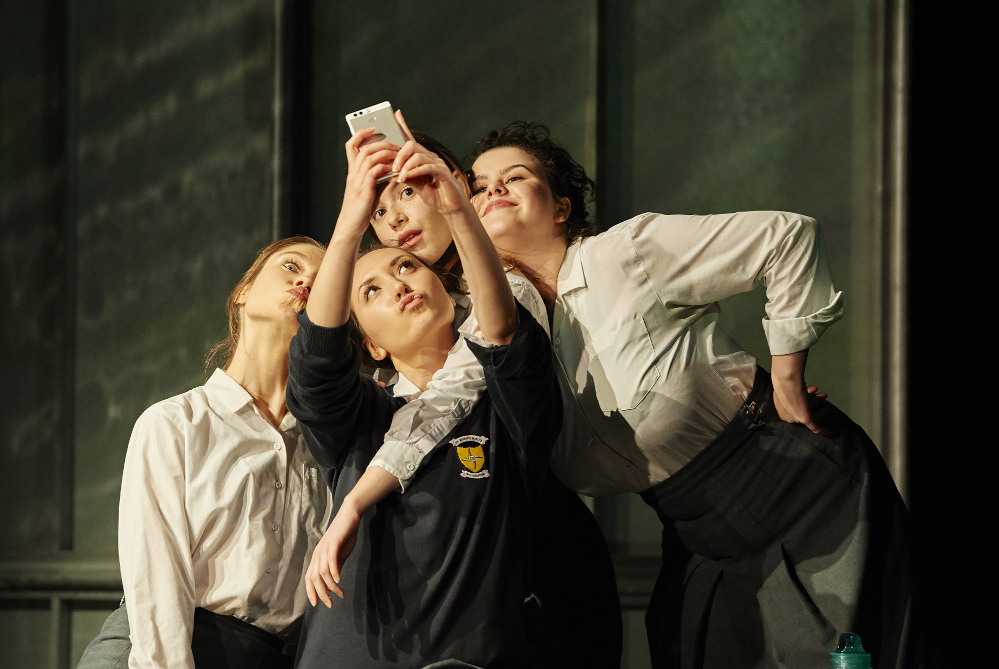
For those who enjoy thought-provoking and challenging drama, this is for you. The subject matter is rape, and by providing an insight into the victim’s perspective the production engenders empathy and promotes understanding. More importantly it asks questions. Based on a novel in the ‘young adult’ genre by Louise O’Neill, it certainly succeeds in achieving what she set out to do with the book – “to start a conversation”. But anyone expecting a late-teenage drama should prepare themselves for some serious adult material, though the rape scene itself is, thankfully, more implied than graphic. Nonetheless, it hits hard, thanks to the adaptation for stage by Meadhbh McHugh.
The story is set in a family home and a secondary school in Ballinatoom, a fictional small town in West Cork, Ireland. The first half introduces us to the characters and sets up the key event, the rape of 18-year old Emma, played by Lauren Coe. It is a hot, hopeful summer of sport and sexual awakening as eight teenagers prepare to finish school and apply to college, looking forward to their bright futures. Something of a pathetic fallacy, the second and far superior half of the play is dark, wet and claustrophobic, and takes place entirely in Emma’s home and she and her family come to terms with the aftermath of her violation. It is in the second half where the drama comes to the fore as we see the incremental destruction of a victim and the impact on her family.
The importance of the subject matter cannot be overstated, and the debates abound. The reporting of rape and serious sexual violence has increased in recent years as police and victim support services have improved and fostered greater trust in people coming forward. Nonetheless, only a fraction of such crimes is ever reported and, of those where arrests are made, prosecutions have decreased, and convictions for reported rapes are fewer than 6%. Public consciousness has been raised by social media campaigns such as #MeToo, but recent high-profile miscarriages of justice have led to a reversal of the Metropolitan Police policy of unquestioningly believing victims. We are living in an ideally receptive social climate for the conversation that O’Neil wanted to start with this play. But is it any good?
Yes, in a word. It is very well researched and entirely plausible and realistic. For the most part it is fairly well-acted and the stage production delivers on a simple but effective set and lighting programme. I was, however, less convinced about the length and pace of the performance. At over three hours long (including a twenty-minute interval), it is something of a marathon with more than a few awkward silences. It needed to be a little slicker with more dynamics worked into the tempo. I was also a little unconvinced with the diction and voice projection of some of the actors. I found myself struggling to hear what was being said. The whole play is performed by an Irish cast and their accents added great charm and authenticity, but this only emphasised the need for more clarity in diction and volume.
There were some strong performances though. Lauren Coe, in the lead role, did a convincing portrayal of the decline of a confident young woman into a voiceless shadow of herself. Her parents, played by Dawn Bradfield as Mam and Simon O’Gorman as Dad, were able to add tension and nuance in the terse family drama of the second half, while the standout performance for me was from Liam Heslin as Emma’s faithful brother Bryan. The four actors dominated the second half of the play, which was mainly static and set in a kitchen that concentrated the drama in a way that was reminiscent of the kitchen in Strindberg’s Miss Julie.
If you are looking for a bit of light entertainment, then give this play a wide berth. But if you want an intense drama to challenge you, don’t miss it. The UK Premiere run is on at The Rep until 15th February. ★★★★☆ Robert Gainer 4th February 2020
Photo by Ros Kavanagh

